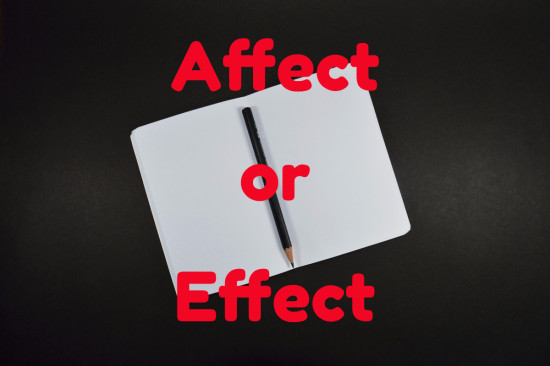Effect vs Affect: Tricks to Remember the Difference

I’m actually quite forgiving about the confusion between these similar-sounding but completely different words. I’m willing to accept perfectly intelligent people are capable of little language vices, but not everyone has my forbearance, and your teachers (and maybe your bosses) are likely to pick up your mistake if you confuse these two words. It just makes you look a bit less intelligent than you really are when you mix them up. So let’s see how you can put your best foot forward by getting it right every time.
Are You Affected by the Law of Cause and Effect?
This little subheading is a dead giveaway and might even be enough to effectively teach this lesson. Here are a few more examples for you:
- The effects of hard drugs affect a person’s ability to succeed.
- The storm had a negative effect on businesses and farms in the areas that were affected by the heavy rain.
- He was powerfully affected by the special effects because he thought they were real.
- What is the effect of the changes in the writing job market, and how will they affect you?
As we can see, both words refer to the consequence of an action or event, but one, “affect” is always a verb, while “effect” is usually a noun. Sometimes, it can be a verb, but it is seldom used in this way. Take a look at these examples:
- We will need to change people’s attitudes if we hope to effect change.
- I hope to effect an upgrade in my standard of living.
In these examples, “effect” is an action that causes a consequence. You can remember the difference between “affect” and “effect” by bearing in mind that to be “affected” by something is the passive result of something else happening, while “effecting” something is an action in itself.
Cheats and Shortcuts
If you find that a bit hard to remember, just use “effect” as a noun. You can test this by putting the word “the” in front of it. If it works, you’re looking at a noun. For instance:
- …the effect.
- …the negative (or positive) effect.
- …the powerful effect.
All of these come from our examples, and we can see that they make some kind of sense, but now try putting “the” where “affect” is the correct word.
- … hard drugs the affect a person’s…
- … that were the affected by the heavy rain.
- .. he was the affected by…
It doesn’t make sense, does it? That’s because “affect” is never a noun.
Do you need another trick to help you remember which word is a noun and which one is a verb? Try this simple method to jog your memory.
Use any word ending in “aven” to help you remember. I can only think of three:
- Haven
- Raven
- Maven
Choose whichever you prefer. Here’s what it will help you remember:
A = affect
V = verb
E = effect
N = noun
Since “effect” is so seldom used as a verb, this little trick should see you through 99% of the time. For the 1% of the time that “effect” is a verb, remembering the active role it plays will answer the question.
Another way of remembering it is to remember that “a” comes first in the alphabet. You have to have an action (verb) before you have a reaction, so “a” will be a verb.
A Couple of Other Uses for “Affect”
Just to round things off, we’ll look at other contexts for “affect.” It can mean acting in a way you don’t feel or putting on some kind of a show for the benefit of others.
- I affected a knowledgeable air as I watched the incomprehensible presentation.
- He has false, affected manners that really irritate me.
Fortunately only one of these bucks the system, and then it isn’t working as a noun, but as an adjective. So now you know which of these words is which, and you won’t get caught out again. Go to the top of the class!


This is one of the ones that drives me crazy when people mix the two words up because there really is no reason to mix up effect and affect. They are so different and are used at totally different times.
These two words are a lot more confusing than they should be. Whereas I can sound out most words to know which one is correct and which isn’t, these two are too close to the same so I can’t do it.
Just remember that affect is almost always a verb and effect is almost always a noun. If you remember this, you’ll be correct 98% of the time.
Thank you for taking the time to discuss the idea, I find myself intently with it and additionally real love looking at more about this kind of theme. In the event capability, mainly because you arrive at mastery, on earth do you insights upgrading your primary webpage utilizing indepth important info? This is useful for all of us.
Affect isn’t ALWAYS a verb. It is used in psychology (and, increasingly, in common speech) to mean expression of emotion.